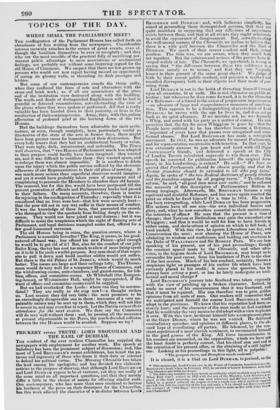TOPICS OF THE DAY.
WHERE SHALL THE PARLIAMENT MEET?
THE conflagration of the Parliament Houses has called forth an abundance of fine writing from the newspapers. Considerable
interest certainly attaches to the scenes of great events, even al- though the localities themselves be ever so unsightly ; and they who are the most sensible of the practical folly of sacrificing per- tnanent public advantage to mere associations or seutimental feelings, are probably not without some lingering regard for the old house of Commons. We suspect that there are few grown-up persons who would not now regret having missed an opportunity of seeing its gloomy walls, or threading its dark passages and lobbies.
But some of our contemporaries overdo the thing sadly, when they confound the fame of acts and characters with the stone and brick work ; as if all our associations of the place and of the institution were destroyed along with the building. The words and deeds of distinguished Englishmen will be had in grateful or detested remembrance, notwithstanding the ruin of the places where they were spoken or performed. All that is really valuable has been handed down to their posterity, or lives in the recollection of their contemporaries. Away, then, with this puling affectation of profound grief at the burning down of the two Houses.
Had the buildings themselves been admirable for their archi- tecture, or even, though unsightly, been particularly useful as illustrative of the state of' the arts in former days, there might have been greater cause for lamentation at their destruction. But every body knows that they had no architectural beauty or value. They were ugly, dark, inconvenient, and unhealthy. The Times well observes, that" two Houses of Parliament much less adapted to their purpose could hardly have been imagined : they wanted air, and it was difficult to ventilate them : they wanted space, and to enlarge them was almost impossible." It is needless to dilate upon the injury which the public service suffered by the obstinate adherence of our Representatives to their old place of meeting. It was much more serious than superficial observers would imagine ; and yet it would have probably taken years of argument and of complaining to persuade the Members to abandon their old haunts. The removal, but for this fire, would have been postponed till the present generation of officials and Parliamentary hacks had passed to their fathers. On many accounts, therefore, there is matter for rejoicing in the conflagration of Thursday ; especially when it is considered that no lives were lost—that few were severely hurt— that the poor did not in any way suffer in their means of comfort. It was the knowledge of these facts, that prevented the crowds who thronged to view the spectacle from feeling deeply on the oc- casion. They would not have joked at real distress ; but it was difficult to resist the temptation which the sight of flaming acts of Parliament, and legal decisions trampled under foot, offered for a few good-humoured sarcasms.
The old Houses being in ruins, the question occurs, where is Parliament to assemble hereafter? The King, it seems, in his good- natured off-hand way, has offered his new Palace—glad enough he would be to get rid of it! But, alas for the comfort of our jolly Sailor King, the toy has cost too much to allow of more being spent on it to fit it for such a useful purpose. Any sum short of that requi- site to pull it down and build another edifice would not suffice. But there is the old Palace of St. James's, which would do much better. The rooms are large and their ceilings lofty. TheThrone- room would do very well for a temporary House of Commons, and the withdrawing-rooms, ante-chambers, and guard-rooms, for lob- bies, offices, and committee-rooms. Or Whitehall (the Banquet- ing-house), or Westminster Hall, might be appropriated, if the want of offices and committee-rooms could be supplied.
But we had overlooked the Lords: where can they be accomo- dated ? They are really in the way now l—a thought strikes us. Last session they did very little : the next promises to be an exceedingly disagreeable one to them: measures of a very un- palatable nature may be sent up to them, which they will not like to assent to, and may even fear to reject. Let the Nation excuse their attendance for the next session. We dare say the Commons will do very well without them : and, by passing all the measures at present objectionable to the Peers, the much-dreaded collision between the two houses would be avoided. Suppose we try ?


















 Previous page
Previous page